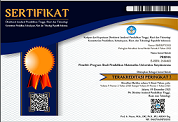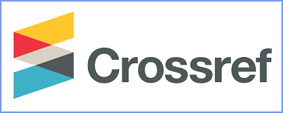LEARNING TRAJECTORIES BASED INQUIRY UNTUK MEMBANGUN MATHEMATICAL KNOWLEDGE FOR TEACHING GURU ANAK USIA DINI
Abstract
Guru mempunyai peran penting dalam meningkatkan kemampuan matematika anak. Oleh karena itu, Mathematical Knowledge for Teaching (MKT) harus dibangun dan ditingkatkan agar dapat melakukan kegiatan pengembangan dengan baik. Untuk meningkatkan kualitasnya, para guru diharapkan terlibat dalam pengembangan profesional atau Professional Development Program (PDP). PDP merupakan sarana untuk menigkatkan dan mempertahankan pengetahuan dan keterampilan yang berkaitan dengan kehidupan profesional guru. Dalam pengembangan program tersebut, diperlukan sebuah model pembelajaran sebagai pedoman pelaksanaannya. Model tersebut diharapkan dapat memancing logika dan pengetahuan guru dalam mengajar matematika. Learning Trajectories Based Inquiry (LTBI) merupakan lintasan belajar dengan menekankan kepada proses mencari dan menemukan. Dalam hal ini, pengetahuan dibangun melalui proses pencarian, serta proses berpikir kritis dan analitis untuk merumuskan kesimpulan. Makalah ini akan membahas apa yang dimaksud dengan Learning Trajectories Based Inquiry (LTBI), bagaimana merancang model LTBI dalam pelaksanaan Professional Development Program (PDP). Serta bagaimana pelaksanaan PDP dengan model LTBI dapat membangun MKT.
Â
Keywords: Â Learning Trajectories Based Inquiry, Mathematical Knowledge for Teaching, Professional Development ProgramÂFull Text:
PDFReferences
Blaiklock, Ken.2012. Te Wha¯riki, the New Zealand early childhood curriculum: is it effective?. International Journal of Early Years Education Vol. 18, No. 3, September 2010, 201_212
Ball, D. L., & Bass, H. (2003). Toward a practice-based theory of mathematical knowledge for teaching. In B. Davis & E. Simmt (Eds.), Proceedings of the 2002 Annual Meeting of National Council of Teachers of Mathematics. (2016).executive summary Principles and Standards for School Mathematics. Availabe at http://www.nctm.org/standards/
Baroody, A. J. (2009). Fostering early numeracy in preschool and kindergarten. Encyclopedia of language and literacy development (pp. 1–9). London, ON: Canadian Language and Literacy Research Network.
Baroody, A. J. 2010. Fostering Early Numeracy in Preschool and Kindergarten. Available at http://www.child-encyclopedia.com/numeracy/according-experts/fostering-early-numeracy-preschool-and-kindergarten. Accessed 11 November 2016
Clements, D. H. (2001). Mathematics in the preschool. Teaching Children Mathematics, 7(4), 270–275.
Clements, D.H., Sarama, J. and DiBiase, A.M. eds., 2003. Engaging young children in mathematics: Standards for early childhood mathematics education. Routledge
Clements, D. H., & Conference Working Group. (2004). Part 1: Major themes and recommendations. In D. H. Clements, J. Sarama, & A.-M. DiBiase (Eds.), Engaging young children in Mathematics: Standards for early childhood mathematics education, pp. 7–76. Mahwah, NJ: Lawrence Erlbaum.
Clements, Douglas H and Sarama, Julie. 2009. Learning Trajectories in Early Mathematics - Sequences of Acquisition and Teaching. Tersedia: http://literacyencyclopedia.ca/index.php?fa=items.show&topi cId=270.
Cohrssen , Caroline, et. all. 2016. Articulating a rights-based argument for mathematics teaching and learning in early childhood education. Australasian Journal of Early Childhood. Volume 41 Number 3 September 2016
Cullen, J. (2000). The early years conceptual issues and future challenges. New Zealand Research in Early Childhood Education, 3, 3-11.
Duncan, G., Dowsett, C., Claessens, A., Magnuson, K., Huston, A., Klebanov, P., et al. (2007). School readiness and later achievement. Developmental Psychology, 43(6), 1428–1446.
Gardner, Howard. "Frames of Mind: The Theory of Multiple Intelligences." (1984).
Gallenstein, Nancy L. 2005. Engaging Young Children in Science and Mathematics .Journal of Elementary Science Education, Vol. 17, No. 2 (Fall 2005), pp. 27-41.
Gelman, R., & Meck, E. (1983). Preschoolers’ counting: Principles before skill. Cognition, 13, 343–359.
Hill, Heather, at.all. Learning Mathematics for Teaching: Results from California’s Mathematics Professional Development Institutes. Journal of Research on Mathematics Education. Vol 35. No 5 , 330-351
Kühne, et.all. 2013. A learning pathway for whole numbers that informs mathematics teaching in the early years. South African Journal of Childhood Education | 2013 3(2): 77-95 | ISSN: 2223-7674 |© UJ
Lee, J., & Ginsburg, H. (2007). Preschool teacher’s beliefs about appropriate early literacy and mathematics education for low- and middle-socioeconomic status children. Early Childhood Education Journal, 18(1), 111–143.
Linder, et, all. 2011. Mathematics in Early Childhood: Research-Based Rationale and Practical Strategies. Early Childhood Educ J (2011) 39:29–37
Lino, dalila. 2010. EARLY CHILDHOOD EDUCATION: KEY COMPETENCES IN TEACHER EDUCATION. Journal Plus Education . available at http://uav.ro/jour/index.php/jpe/article/view/668
Leong, Eu, Kwan, et. all. 2015. Understanding Malaysian Pre-Service Teachers Mathematical Content Knowledge and Pedagogical Content Knowledge. Eurasia Journal of Mathematics, Science & Technology Education, 2015, 11(2), 363-370
NCTM. 2013. Mathematics in Early Childhood Learning . A Position of the National Council of Teachers of Mathematics
Watts, et.all. What’s Past Is Prologue: Relations Between Early Mathematics Knowledge and High School Achievement. EDUCATIONAL RESEARCHER. October 2014 vol. 43 no. 7 352-360
Wilson, P. H., Sztajn, P., & Edgington, C. (2013). Designing professional learning tasks for mathematics Learning Trajectories. PNA, 7(4), 135-143.
Wilson, et. All. 2014. Teachers’ use of their mathematical knowledge for teaching in learning a mathematics learning trajectory. J Math Teacher Educ (2014) 17:149–175
DOI: https://doi.org/10.35194/jp.v7i2.234
Refbacks
- There are currently no refbacks.
Copyright (c) 2018 PRISMA
Prisma Indexing :Â

PRISMA by UNIVERSITAS SURYAKANCANA is licensed under a This work is licensed under a Creative Commons Attribution-ShareAlike 4.0 International License.Based on a work at https://jurnal.unsur.ac.id/prisma.


1.jpg)








